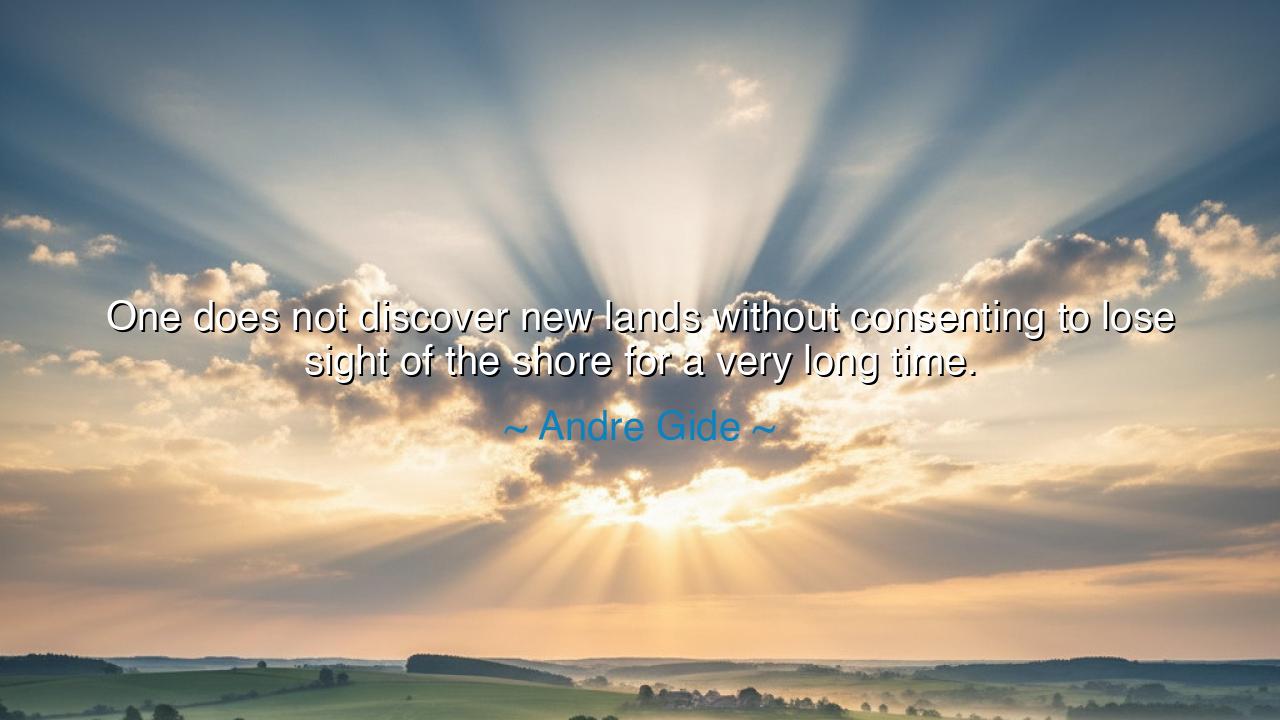
One does not discover new lands without consenting to lose sight
One does not discover new lands without consenting to lose sight of the shore for a very long time.






Hear the words of André Gide, seeker of truth and chronicler of the human spirit: “One does not discover new lands without consenting to lose sight of the shore for a very long time.” These words carry the breath of the sea, but their meaning sails far beyond the waters. They speak of courage, of risk, of the sacred willingness to step away from certainty and comfort, to enter the unknown where all progress is born. For no man finds fresh horizons while clinging still to the safety of the familiar coast.
The ancients knew this truth in their marrow. Did not the sailors of Phoenicia and Greece, and later the daring navigators of Portugal and Spain, brave the vast and perilous oceans? To set forth in search of new lands meant to leave behind the sight of the shore, that comforting line that promised safety. They entered waters where maps faded into mystery, where storms threatened, and where no promise of return was certain. Yet by such journeys, the world itself was redrawn, and mankind’s vision widened forever.
Consider the tale of Christopher Columbus. Though his name now stirs both admiration and debate, his voyage stands as a testament to Gide’s wisdom. He sailed westward into uncharted seas, guided by conviction that new lands lay beyond. For weeks his men despaired, begging to return to the shore of Europe, fearing death in the endless waters. But Columbus pressed on. At last, new lands appeared, and the course of history was altered. Without enduring the terror of distance, no discovery could have been made.
So it is not only with ships and oceans, but with the voyages of the soul. The philosopher, the artist, the inventor, the reformer—each must leave behind the safe harbors of tradition. To compose a new symphony, to craft a new invention, to proclaim a new vision of justice—these are voyages into uncharted waters. The world often mocks such travelers, warning them to remain on the shore. Yet if they had obeyed, the world would never have known progress, beauty, or transformation.
But take heed, O seekers of wisdom: the journey is long, and the shore once lost from sight may stir fear. Doubt rises like waves, and loneliness deepens like the horizon. This is the cost of discovery. Many turn back, longing for safety, unwilling to trust the unseen. Yet those who endure, who continue rowing into mystery, are the ones who return bearing treasures of truth, new lands of knowledge, and paths that others may follow.
The lesson is plain: if you would achieve greatness, you must abandon certainty. Do not expect to find new lands while clinging to what is safe and known. Whether in career, in learning, in love, or in faith, you must be willing to venture forth, risking failure and hardship, trusting that the horizon conceals opportunities unseen. To demand comfort is to forfeit discovery; to embrace uncertainty is to inherit growth.
Practical wisdom lies before you: do not fear the absence of the shore. If you feel lost, adrift, uncertain, know that this is the very sign you are on the path of discovery. Mark your compass with purpose, hold your sails to the wind of perseverance, and trust that the sea, though wide and dark, carries within it the promise of arrival. Embrace the unknown, for only in venturing there will you find the greatness that lies beyond sight.
Therefore, let Gide’s words be etched into your heart: “One does not discover new lands without consenting to lose sight of the shore for a very long time.” Remember that every discovery—every truth, every innovation, every personal transformation—was purchased by the courage to drift far from safety. May you too be bold enough to leave the shore, so that your life may reveal its hidden continents, its unseen treasures, and its unimagined horizons.






AAdministratorAdministrator
Welcome, honored guests. Please leave a comment, we will respond soon